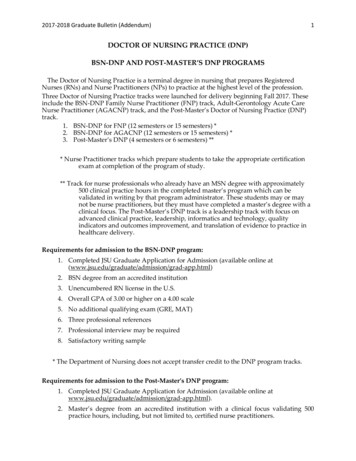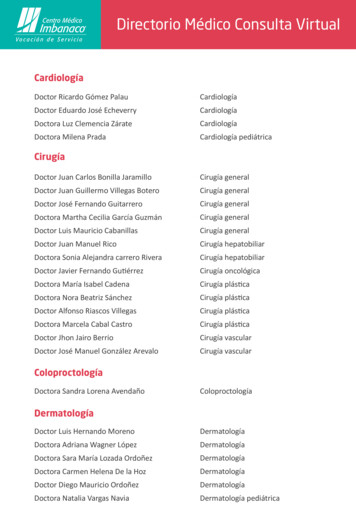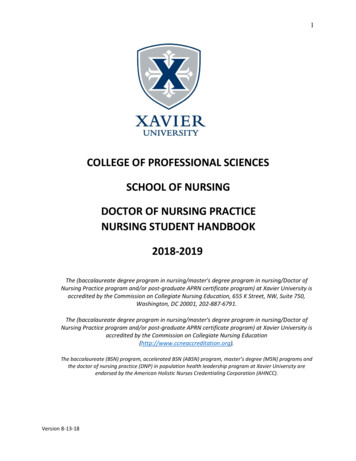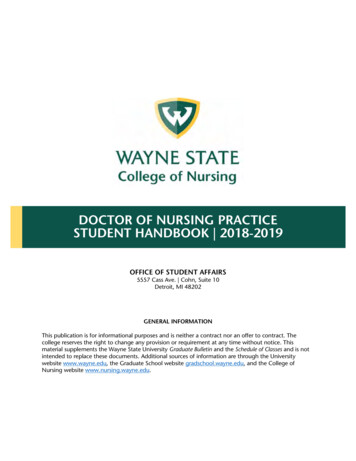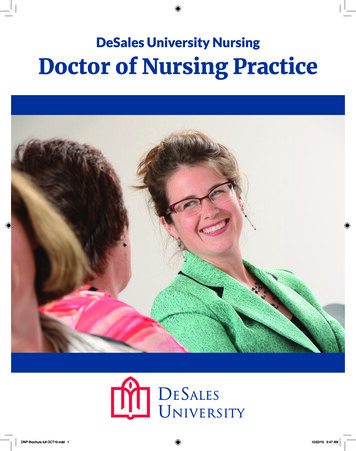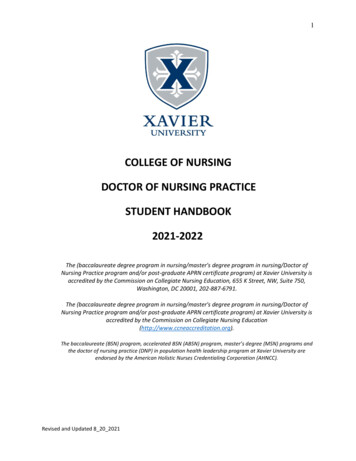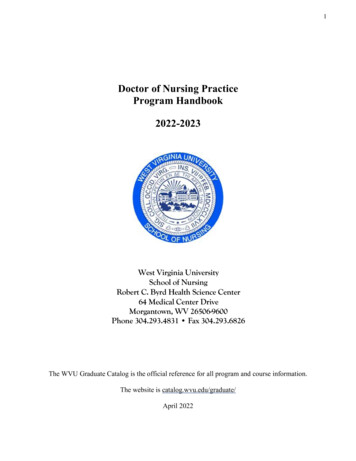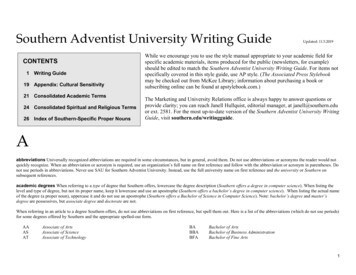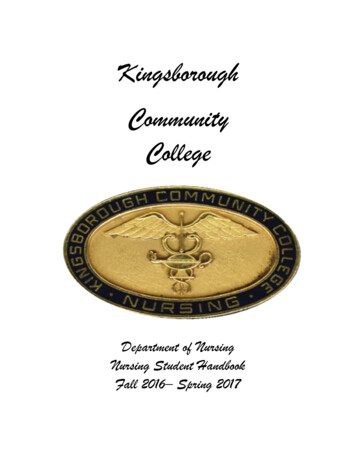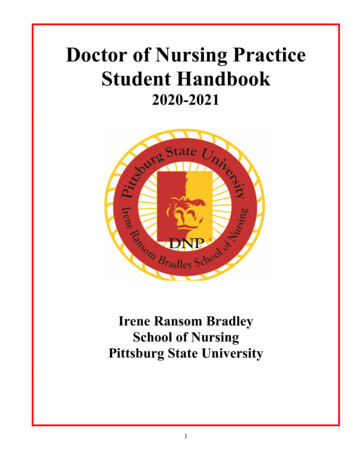
Transcription
Doctor of Nursing PracticeStudent Handbook2020-2021Irene Ransom BradleySchool of NursingPittsburg State University1
Welcome to the Pittsburg State UniversityIrene Ransom Bradley School of NursingDoctor of Nursing Practice ProgramDNP Student HandbookA Message from the DirectorAs you begin your Doctor of Nursing Practice program, the faculty and I would like to extend you a warmwelcome! We congratulate you on your decision to pursue a Doctor of Nursing Practice (DNP) degree inattainment of your personal and professional goals. The Irene Ransom Bradley School of Nursing isproud to offer the first rural based DNP program in Kansas. We also take pride in offering the DNP inpreparation of advanced practice nurses in the role of a Family Nurse Practitioner. The program isapproved by the Kansas State Board of Nursing and meets Higher Learning Commission standards.Pittsburg State University Irene Ransom Bradley School of Nursing is proud to announce that the CCNEBoard of Commissioners acted at its meeting on April 25-27, 2017 to grant accreditation to the Doctor ofNursing Practice (DNP) program for 5 years, extending to June 30, 2022.Our faculty and staff strive to instill in our students the PSU core values of “student-focused, excellence,by doing learn, diversity, community, innovation and sustainability”. Nursing’s vital role in servingindividuals and populations in a variety of settings perpetuates the University’s founding principle of “bydoing learn”. This handbook has been prepared to facilitate your success in the program with a primarypurpose of informing you of the policies and procedures within the School of Nursing. This handbookoutlines your rights and responsibilities as a PSU graduate nursing student; you are charged with theresponsibility to read, understand and follow all policies and procedures. It is important that you keep yourhandbook as a reference. If any changes or additions are made, the School of Nursing will provide themto you. If you have questions, please ask!We wish you the very best throughout your graduate nursing education. Faculty have designed rigorouscurricula with innovative classroom, clinical lab and community experiences which you will findstimulating and fulfilling while enabling you to grow in your profession. I encourage you to communicateoften with your faculty advisor, course faculty and me. Please feel free to stop by my office and say hello.We thank you for choosing Pittsburg State University.Go Gorillas!Sincerely,Cheryl Giefer, PhD, APRNDirectorIrene Ransom Bradley School of NursingOAGAAG2
TABLE OF CONTENTSPageWelcome – Cheryl Giefer, Director. 1Notice of Nondiscrimination. 6Organizational Chart, Irene Ransom Bradley School of Nursing. 7Organizational Chart, Pittsburg State University. 8School of NursingFull-time Faculty/Staff. 9History. 10Traditions.12PSU Commemoration Day.12Pinning Ceremony.13Mission and GovernanceMission Statement.14Core Values.14Mission Elements.14Conceptual Framework.15Program Outcomes.16Advanced Practice Definitions.16Convictions or Disciplinary Action.17DNP Program Plans of StudyBSN to DNP, 4-Year Plan . 19BSN to DNP with Education Emphasis, 4-Year Plan .21MSN to DNP, 2-Year Plan.23MSN to DNP with Education Emphasis, 2-Year Plan.24Standards for Doctor of Nursing Practice Graduate Program .25ANA Code of Ethics for Nurses .25Advanced Practice Code of Ethics .26Dishonesty in Academic Work .27Honesty Pledge .27Curriculum, Academic Requirements and Progression . 27Time Limit to Complete Degree .27Transfer and Waiver of Credit Policy . 27Validation of Previous Work. 27Planning to Meet Degree Requirements. 28Academic Standing . 28Graduate Nursing Progression Policy . 28Degree Plans and Enrollment Out of Sequence . 28Dismissal Due to Unsatisfactory Performance. 28Withdrawal from Classes . 29Incomplete Grades . 29Student Success . 29Code of Student Rights and Responsibilities . 29Steps for Resolving Academic Conflicts . 29Graduate Catalog and Handbooks for Graduate Students . 30Individual Practice Hour Requirement . . 30Individual Practice Hour Report . . 31Academic Due Process for Grievance . . 32Research Skills and Responsible Scholarship . 33Protection of Human Subjects (IRB) Policy . 33Financial Assistance and Scholarships . . 33Nursing Scholarships . 33Additional Sources for Financial Aid. 34Policies for Doctor of Nursing Practice Majors . 343
Documentation of Learning Outcomes . 34Educational Data . 34Learning Resources in McPherson. 34Learning Resources on Campus . 34Special Programs . 35Recording Release for use by Students . 35Recording Release Form . 36Access to School Student Records . 37Posting of Grades by Faculty . 37Standards for Written Work . 37Absence from Examination . 37Class Attendance/Class Absences . 37FNP Board Certification Review Course . .38Preparation for APRN Practice . .38Standardized Testing Costs/Typhon Cost . .38MyRecordTracker, Certiphi Screening . 39Reference/Recommendation Request . .40Communications Policy . 41Gorilla Geeks . . 41Ethics for Computer Use . 41Student Participation in School Committee Meetings . 42Acceptance of Gifts . 42Student Employment Policy . 42Graduate Assistantships . 42Requirements for Appointment . 43Graduate Assistantships Policy . 43Student Crisis Response Procedure . 43Severe Weather Emergency Plan . 44Map-McPherson Hall Emergency TelephoneFire Alarm Boxes, Fire Extinguishers . 45Active Shooter Response Plan . 46Concealed Carry . 46Student Health and Counseling Services . 46Personal Injury Policy .47Needle safety/Needle stick Policy . 47Health Information Privacy Policy (HIPPA) . 47Arrests and/or Convictions . 47Disciplinary Policy . 47Policy on Prevention of Alcohol and Drug Abuse . 48Substance Abuse and Drug Testing . 48Policy for Professional Assistance Program . 52Violence and Abuse Policy . 52McPherson Hall Food and Drinks . 52Faculty Office Hours . 52A Nurse’s Guide to Social Media . 53Requirements for DNP Clinical Experience . 54ACLS Policy . 54BLS Policy . 54Registered Nursing License . 54Annual Tuberculin Screening . 54Essential Nursing Physical Functions . .54Health Impairment in Clinical Practicum Experiences .55Liability Insurance . 55Dress Code (Clinical Assignment) . 56Evaluation of Clinical Performance .574
Absence from Clinical Assignments .57Blood and Body Substance Exposure Policy .57Smoking Policy . 57Health Simulation Center/Learning Resources (HSC/LRC) Center Policies . 58Transportation Policy .58Inclement Weather .58Special Concerns .59Academic Honors .59DNP Clinical Preceptors . 60Steps for Securing Clinical Preceptors . 61Clinical Facility and Preceptor Information Sheet .62Preceptor Information . 63Assessment of Student Learning Outcomes .64Performance Evaluation for the DNP Student . 64Preceptor Evaluation of Student .65DNP Comprehensive Exam .69Evaluation of Written Comprehensive Exam. 70DNP Scholarly Project .71Checklist for Scholarly Project .75Protocol for Presentation . 76DNP Scholarly Project Podium Presentation Evaluation .77Assessment of Outcomes of Residency . 78Index . .79Disclaimer .825
NOTICE OF NONDISCRIMINATIONPittsburg State University prohibits discrimination on the basis of race, color, religion, sex, national origin,sexual orientation, age, marital or parental status, ancestry, genetic information, gender identity, genderexpression, military or veteran status, or disabilities. The following person has been designated to addressinquiries regarding the nondiscrimination policies: Director of Institutional Equity/Title IX Coordinator,Cindy Johnson, 218 Russ Hall, 1701 S. Broadway, Pittsburg, KS 66762-7528, 620-235-4189,equity@pittstate.edu.NOTICE TO STUDENTSPittsburg State University is committed to a policy of educational equity. Accordingly, the Universityadmits students, grants financial aid and scholarships, conducts all educational programs, activities, andemployment practices without regard to race, color, religion, sex, national origin, sexual orientation, age,marital or parental status, ancestry, genetic information, gender identity, gender expression, military orveteran status, or disabilities. Students seeking assistance with academic programs because of disabilitiesare to contact the Coordinator of Student Accommodations, 219 Russ Hall, Pittsburg State University,Pittsburg, KS 66762, (620) 235-6584.6
7
8
SCHOOL OF NURSING GRADUATE FACULTY & STAFFFull-Time FacultyMary Carol Pomatto, Dean CASCheryl Giefer, DirectorAmanda AlonzoKim BylerKristi FrisbeeAshleigh HeterJennifer HarrisAmy HiteKaren JohnsonTrina LareryTracy StahlBarbara R. McClaskeyJeff WaddellE-Mail ttstate.edujmwaddel@pittstate.eduOffice Number311 tOffice Phone(620) 230-9888(620)235-4438(620)235-4432(620) 875-6325(620) 235-4434(620) 235-4439(620) 235-4447(620) 235-6528(620) 235-6187(620) 235-6121(620) 235-4445(620) 235-4443(641) 622-1170HSC/LRC CoordinatorJulie DrenickAdministrative SpecialistTracy MussaAdministrative AssociateJanene HudiburgAdministrative AssociateElizabeth MiddenforfCustodianErma Hedgesjadrenick@pittstate.edu132(620) 249-0320tmussa@pittstate.edu101(620) 235-4431jhudiburg@pittstate.edu101(620) 235-4332elizabethmiddendorf@pittstate.edu101(620) 235-60379
Introduction to Pittsburg State UniversityPittsburg State University (PSU) began in 1903 as the Auxiliary Manual Training Normal School and itbecame a four-year institution in 1913. Graduate level education became important early in the existenceof PSU as the Graduate Division was organized in 1929 to confer the Master of Science degree. TheCollege was renamed Kansas State Teachers College of Pittsburg in 1932. The College was authorized togrant the Specialist in Education degree in 1958. The College was renamed Kansas State College ofPittsburg in 1959 and the Graduate Division was authorized by the Kansas Board of Regents (KBOR) toconfer the Master of Arts degree in English, History, and Mathematics. The current structure of fourcolleges was established in 1966 (College of Education, College of Arts & Sciences, Kelce College ofBusiness, and College of Technology). Master’s degrees in Music and Business Administration wereadded in 1968 and 1974, respectively. The College was granted university status in 1977 and the name ofthe Graduate Division was changed to the Graduate School in 1984. PSU is one of six comprehensiveregional universities governed by the Kansas Board of Regents (KBOR); and the only four-year Kansasstate university within a one-hundred-mile radius in rural southeast Kansas. Pittsburg State University isgoverned by a single President, Dr. Steve Scott, who reports to the KBOR. PSU is fully andenthusiastically supported by the local community with a unique “town and gown” relationship and sits on223 acres on the southern edge of Pittsburg, Kansas. The University transfers credit from all regionallyaccredited U.S. institutions, all international institutions approved by the Ministry of Education, and allmilitary and other course credits evaluated by the American Council on Education, advanced placement,College Level Examination Program (CLEP), and DANTES College Level Examination Program. PSU’sgrowing list of courses is approved by the Kansas Board of Regents (KBOR) for guaranteed transferamong all Kansas public postsecondary institutions. PSU maintains 2 2 articulation agreements forstudents with an Associate of Arts (AA) and Science (AS) degree with many community colleges inKansas and Missouri. Information about transfer credit and reverse transfer credit is written andaccessible on the University’s website at elencyguidelines.html as well as articulation and 2-plus-2 agreements: us-2.htmlPSU serves over 6,600 students through more than 200 academic programs and over 150 student clubs andorganizations and has a large enrollment in upper division and graduate courses. The student to facultyratio is 17-to-1 and the average undergraduate class size is 18. Most PSU students are white (80 percent).Approximately 7.5% of student’s self-report identifying as of two or more races; 3.3% report identify asblack, 1.7% report identify as Native American, 6.2% report being of Hispanic ethnicity, and 1.17% reportidentifying as Asian or Pacific Islander (1.17%). PSU has maintained regional accreditation by the HigherLearning Commission (HLC) of the North Central Association since 1915. In 2009, PSU was selected bythe HLC to test a new model of accreditation, one that focuses on a major quality initiative orimprovement “Pathway”. The “Pathway” follows a 10-year cycle focused on assessment andimprovement of student learning, which is consistent with the University’s core values of excellence andinnovation. The Higher Learning Commission reaffirmed the University’s continuing accreditation inJune 2013. Since that time, the University completed a successful Year Four Assurance Review in 2017,demonstrating continued compliance with all criteria. The next scheduled Comprehensive Evaluation forreaffirmation of accreditation is in AY 2023. Additional accreditations and institutional memberships arelisted on the university website at: .Department of Nursing/Irene Ransom Bradley School of NursingThe PSU Department of Nursing (DON) began in 1970, following a recommendation by KBOR andestablishment by the Kansas State Legislature. Establishment of the DON resulted from a shared vision10
and many years of collaboration and planning by the University, Mount Carmel Medical Center (MCMC),and the community. MCMC (now Via Christi Hospital) agreed to discontinue its diploma nursingprogram when the University was ready to begin a Bachelor of Science in Nursing (BSN) degree program.The DON admitted its first cohort of BSN pre-licensure students in fall 1971 and the first cohort ofregistered nurse (RN) to BSN students was admitted in 1973. During the DON era, the pre-licensure BSNand RN to BSN tracks, Master of Science in Nursing degree (MSN) program with Clinical NurseSpecialist (CNS) tracks in Family Health and Gerontology; and a Family Nurse Practitioner (FNP) trackwere established. The MSN program also included the functional areas of administration and education.The DON was granted school status in 2013 and was renamed the Irene Ransom Bradley School ofNursing (IRBSON) in honor of the mother of PSU alumnus Dr. Fay Bradley, who gifted one milliondollars to the University to benefit nursing education. The IRBSON is one of twelve academic programsin the College of Arts and Sciences (CAS) and is the largest academic major at PSU. In addition to aGraduate School, the University consists of the College of Education, College of Technology, and theCollege of Business.In 1993, the first cohort of students in the Master of Science in Nursing (MSN) degree program in familyhealth were admitted. The Kansas Advanced Practice Collaborative (KAPC) was formed in 2009 with theUniversity of Kansas, Fort Hays State University and Pittsburg State University. The affiliating agencies(plus Wichita State University) are charter members of the Kansas Primary Care Nurse PractitionerProgram, which began in 1993 to prepare FNPs to serve residents of rural and urban medicallyunderserved areas. From 2009-2019, the KAPC provided shared courses in each school’s FNP program asa multi-state masters level FNP program, with 55% of the collective graduates remaining in Kansas; 35%remaining in Missouri; and 10% remaining in Oklahoma; with 97.77% of the KAPC graduates practicingin critically-or medically-underserved areas. This program is a model for the nation as it demonstrates acollaborative effort of the flagship research institution in Kansas and regional universities sharingresources and delivering stellar FNP programs with exceptional outcomes. The MSN program maintainedcontinuous approval by the Kansas State Board of Nursing (KSBN) since its inception. PSU’s MSNprogram was accredited by the National League for Nursing Accrediting Commission in 2000 and by theCCNE in 2010. Increased local and regional demand for FNPs resulted in decreased enrolment in the CNStracks. On June 24, 2013, the Executive Committee of the Commission on Collegiate Nurse Education(CCNE) acted to approve the substantive change notification indicating PSU would no longer offer theClinical Nurse Specialist track in the MSN curriculum beginning fall Semester 2012. Discontinuation ofthe MSN program’s FNP track also was approved by the University, KBOR, KSBN, and HLC in 2013due to changing national standards advocating preparation of nurse practitioners at the doctoral level.During 2010, PSU began preliminary steps to offer the Doctor of Nursing Practice (DNP) degree programwith sabbatical work by Dr. Mary Carol Pomatto, assisted by Dr. Amy Hite, who conducted a feasibilitystudy. Dr. Cheryl Giefer began work on the MSN to DNP and BSN to DNP curriculum development in2011. The Director, faculty, staff, and student leaders worked closely with the Advisory Council, GrantsAccountability Committee, KAPC, local and regional health care and educational institutions, externalconsultants, alumni, and other communities of interest to transition the MSN/FNP track to the DNPprogram and a DNP task force was established. The University Graduate Council approved thetransitioning the MSN to the DNP degree in 2013 and approval from the KBOR, KSBN, and HLCfollowed in 2014. On March 30, 2016, the Executive Committee of CCNE approved the substantivechange request submitted by the SON for approval of a change in the existing Master of Science inNursing degree program to the DNP level. The last five MSN/FNP majors graduated in July 2017 and themaster’s program continued as an MSN with Education Emphasis students in August 2017.11
The first cohort of students in the MSN to DNP track began in June 2015 and students graduatedDecember 2016. The first BSN to DNP cohort began in June 2016 and these students graduated in May2019. The last students admitted to the MSN program/FNP track graduated in July 2017. The DNPprogram is the first doctoral degree offered by PSU and the first rural-based DNP program in Kansas. TheBSN to DNP track offers an Advanced Practice Nursing major with specialization in the FNP role whilethe MSN to DNP track offers a clinical doctorate for nurses who have a Master of Science of Nursingdegree and are nationally certified as a FNP who wish to become leaders and scholars. Additionally, theDNP program offers a nursing education emphasis to address the clinical nursing faculty shortage inKansas and across the nation. The last five MSN/FNP majors graduated in July 2017 and the master’sprogram continued as an MSN with Education Emphasis students in August 2017. The first four MSNEducation students graduated in May 2019.Accreditation Status: The BSN program was initially accredited by the National League for NursingProgram Council of Baccalaureate and Higher Degree Programs in 1975 and reaccredited in 1981,1989, and 2000. The BSN and MSN programs were initially accredited by CCNE in 2005,reaccredited in 2010 with the next evaluation occurring in 2019. The DNP program was grantedCCNE accreditation in October 2016. The BSN curricula and program outcomes werecomprehensiv
Pittsburg State University Irene Ransom Bradley School of Nursing is proud to announce that the CCNE Board of Commissioners acted at its meeting on April 25-27, 2017 to grant accreditation to the Doctor of Nursing Practice (DNP) program for 5 years, extending to June 30, 2022.
